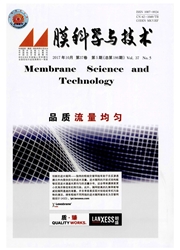

 中文摘要:
中文摘要:
天然多糖海藻酸钠具有良好的生物相容性、生物降解性、黏附性以及独特的应力形变一释放特性,因此,海藻酸钠外覆聚电解质复合膜形成的微胶囊是很有前途的细胞培养和药物缓控释载体.膜的渗透分离特性决定了海藻酸盐基微囊的物质扩散传递行为,对其在生物医学领域的应用至关重要.本文主要综述了海藻酸盐基微囊膜的传质数学模型研究,概述了小分子物质、大分子蛋白以及氧气在海藻酸盐基微囊膜上的扩散传递行为,总结了材料物化性能、pH值等参数对微囊膜渗透性能的影响规律,对海藻酸盐基微胶囊的制备和应用具有较大的参考价值.
 英文摘要:
英文摘要:
Natural polysaccharide alginate shows good biocompatibility, biodegradability, adhesi-on, as well as unique deformation stress-release characteristics, so that alginate-based microcapsules with outer polyelectrolyte complex membrane are promising carriers for cell culture and sustained/controlled release. Membrane permeability can decide the diffusion and mass transfer properties of alginate-based microcapsules, which is critical for its application in the biomedical field. We mainly discussed the mathematical models of mass transfer on microcapsule membrane, the diffusion behavior of small molecules, macromolecules (such as proteins) and oxygen in alginate-based microcapsules membrane, summarized the influence rules of parameters such as materials properties, pH on membrane permeability. It is hopeful to provide reference for the preparation and application of alginate-based microcapsules.
 同期刊论文项目
同期刊论文项目
 同项目期刊论文
同项目期刊论文
 期刊信息
期刊信息
